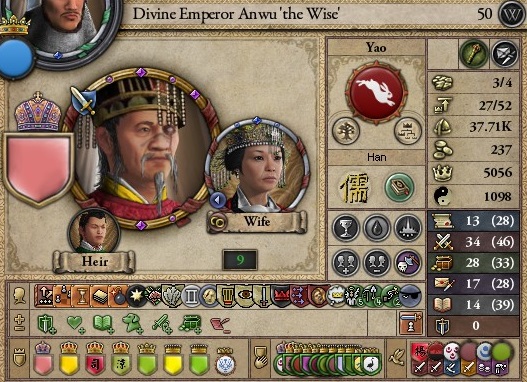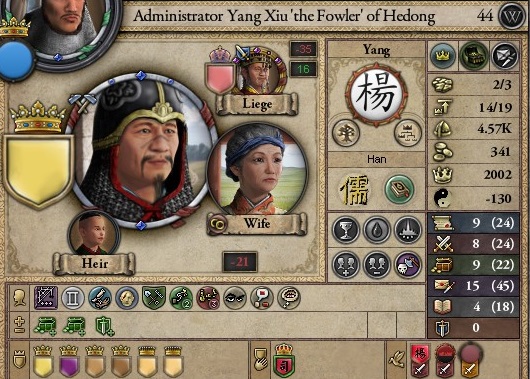219-220: THE YANG CAMPAIGN
Yang Province had been thrown into turmoil ever since the death of Governor Lu Xun in 214. He had managed to push out every single remaining rival after he inherited the province from his father Lu Jun in 201, including two successful wars with
Hu Zan. His efforts to rebuild his broken province had been successful enough for him to get involved into neighboring realms, becoming a key ally of his northern neighbor Governor
Xiao Ru of Chen Province. Lu Xun. While not on the same level as
Yao Shuren, Gongsun Zan or Xiao Ru in term of power, ambitions and influence, the Governor of Yang Province had proven an apt warlord in the late Han era. And then he died unexpectedly at the age of 31 in 214, sending his province into a swift decline.
Lu Xun’s eldest son, Lu Dun, was only eleven at the time of his father’s death, which led some to argue that maybe Lu Xun’s brother should take control of the province instead. Said brother, Lu Mao, was certainly supportive of the idea. But instead, Lu Dun was installed as Governor of Yang Province, with the old Lun Shi as his regent. Lun Shi, first appointed by
Yang Weili to take care of Hefei for him, had joined Lu Jun’s side in the civil war, which allowed him to remain a close associate of the Lu Clan in the following decades. The old man now found himself in control of the province’s government until the young Lu Dun was old enough to lead in his own right. But the choice of Lun Shi proved controversial. While he was a hardworking man, he was also extremely flawed. Lecherous, greedy, timid, cowardly… All words that could be applied to the regent. Some even accused him of cannibalism.

Needless to say, his position was not one of strength. Lu Mao, who felt snubbed out of the governorship, began to challenge the regent for control of his nephew. But Lu Mao was a terrible politician, and he never hid the fact that his ultimate goal to take control of Yang Province for himself. Had it been anyone more competent, the regency of Lun Shi would have easily collapsed against the attacks. But Lu Mao failed to take advantage of any opportunity that was presented to him, even if dissatisfied officials did rally around him over the years. Thanks to his incompetence, Lun Shi was able to lead his regency through its five years term, with Lu Dun gaining full control of the province in early 219. Which left Lu Mao with only one option. Just as Yao Shuren was proclaiming the birth of the Liang Dynasty, Lu Mao had his nephew Lu Dun assassinated.
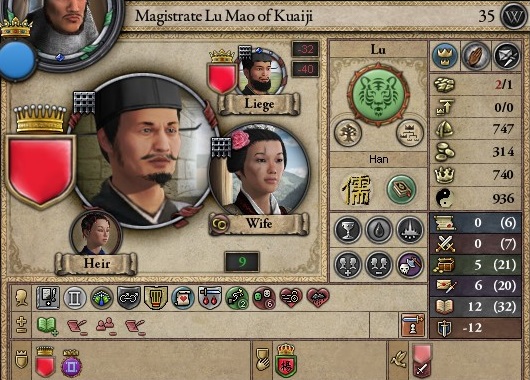

Someone more competent would have either been able to hide his role in the murder or be able to follow this with a successful coup. But Lu Mao was not competent, leaving him the mastermind behind Lu Dun’s death without gaining any benefits out of it. The treasonous uncle retreated to his homebase on the coast… and celebrated. Thankfully for him, Lun Shi was now back in charge, now regent for the thirteen years old Lu Zhousheng. As had been the case for the last five years, Lun Shi was too scare of a confrontation to retaliate against Lu Mao. This left Lu Mao convinced that the time was right to take control of the province. The only hiccup was that his supporters had abandoned him due to his horrifying act. Thankfully, he saw another potential ally that would surely help him get what was his by right. In June 219, he sent a messenger to Chang’an, demanding (not asking, demanding) that Emperor Anwu send him aid to take control of the province. In exchange, he would submit himself to the Liang Dynasty as Governor of Yang Province.

What Lu Mao didn’t know when he sent his messenger was that Emperor Anwu had already announced his new campaign to reclaim Yang Province. But he had no plan to allow the Lu Clan to retain control of the region. No, this sort of regional powerbase would be unacceptable. As the emperor, he would decide who was to be governor, and for how long. As he prepared his campaign in early July, many courtiers came forward to advise Emperor Anwu not to go in person. While this was acceptable during his times as a conquering warlord, things were now different. He was the Son of Heaven. Campaigning should be left to his generals and his officers. His place was in Chang’an, to oversee the realm and radiate throughout the court with his wisdom and greatness. The Grand Tutor Duan Zuo even said:
“An emperor must reign from his throne, not from a saddle.”
But Emperor Anwu did not share the same opinion.
“How can I sit idly on my throne while the realm has yet to know peace? How can I surrender this heavenly duty to others?” He did not know if he was ever going to reunify China in his lifetime, or if this duty would fall on whichever son succeeded him. But never had it ever crossed his mind that he wouldn’t try. The more territories he gained, the more stable the future of the Liang Dynasty would be, and the less problems his successors would have. Someone advised him that consulting the court astrologers might ease his doubts about the future, but Emperor Anwu put an end to this discussion. He was going so that he could mold the future himself. He appointed his Chancellor
Pan Zheng and Excellency of the Masses Xu Shu as the regents in his absence, after which he departed to review his troops.


Emperor Anwu would take command of the main army, which included his now ferocious elite cavalry. These Xianbei horse riders were given some of the best Chinese equipment available for the time, allowing them to bring the best of both sides. His son-in-law Xibaxiong, Budugen’s heir, was among the commanders of this Xianbei force. While some of his horsemen had been employed in previous campaigns, this would prove Xibaxiong’s first Chinese war. Emperor Anwu hoped that this little familial campaign together might help build better relationships between the Liang Dynasty and the Xianbei Confederation on the long term. While Budugen had proven amiable, he was no longer in the prime of his life. Smoothing his successor into a pro-Chinese stance would make things easier on the long run. A noble goal, but one that would backfire, as Xibaxiong’s hatred of the “weak southern way of life” would only be confirmed by the comfortable camp life of the Chinese officers.

Someone else who was dragged on a military family trip was Xuan Mei, the oldest living son of the great general
Xuan Su. For all the love Xuan Su gave to his son, the fact was that his status as a hunchback would play against the poor boy. With Xuan Su still suffering from consumption, this might be the last opportunity to give his son some military experience. Sadly for both of them, Xuan Mei’s appearance had left the teenager scared and afraid of violence, always trying to avoid confrontations due to his physical stature. Xuan Mei was doubly unmotivated to go by the fact that he had a wife now. He was married to the daughter of Han Fu (the Governor of Ji Province before Gongsun Zan took it over in 192) and had a pretty good married life. In fact, his wife was within the last month of her pregnancy (the child would be a daughter named Xuan Youwei). But, having immense respect for his father and little backbone, Xuan Mei went along with dear old dad, leaving for a campaign on the other side of China.


Emperor Anwu had envisioned this campaign as a three armies offensive. Each army would have enough troops to challenge the full Yang forces if needed, ensuring that none would prove the weak link of this operation. From the north, Xuan Su would march south, establishing a foothold before advancing steadily toward the provincial capital. This would more than likely be the main target of the Yang response. Another army, led by Emperor Anwu himself and including his Xianbei cavalry, would first deal with the peasant rebellion before attacking from the west. The goal here would be to pincer the provincial capital from two sides, leaving them with no option but to surrender. Finally, the third army of Hu Zhen would make its way through the undeveloped southern jungles. From his studies of the province, Emperor Anwu understood that the south could serve as a holdout for the Yang forces should they lose the provincial capital.This tactic had been proven successful on multiple occasions already, which is why the Emperor needed to neutralize the region from the start.
This was a strong plan, one designed to ensure that this didn’t drag for a decade like his Yi campaign. He even had a backup plan should the Yang troops somehow find a way to stall his advance. Xu Chu, the General who Manifest Might, was in the process of training a fourth army. The general would then lead it to reinforce Xuan Su, allowing the two of them to steamroll to the provincial capital and ensure an imperial victory.
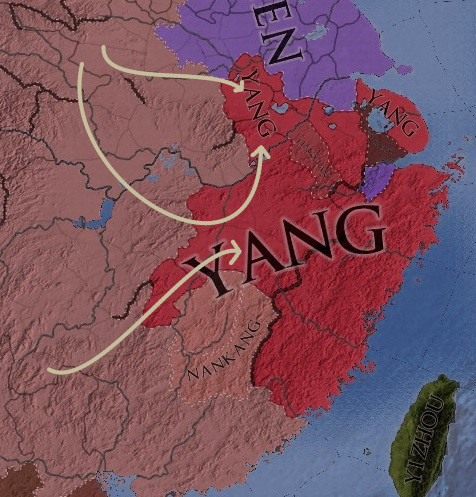
The plan was put into place, with the various generals all ready to show their worth. Xuan Su was happy to be finally be given the command of an army without oversight. Yes, the Emperor was leading his own forces, ensuring that any betrayal would be met by a swift defeat on the battlefield. But Xuan Su hoped to gain control of the Yang provincial capital quickly. If he was able to end the campaign before reinforcements arrived, then he would be the hero of the day, something that he could exploit to gain promotions. Meanwhile, Xu Chu found himself frustrated and angry. He wanted to see action, not handle logistics with Yang Xiu. The Grand Commandant could handle all that nonsense, but he was the General who Manifests Might! He needed to be on the battlefield as soon as possible! As for Hu Zhen, the 74 years old simply wanted to make sure that his southern army didn’t fall into a trap. At his age, this would likely be his last campaign, so now was not the time to fail his liege.


The offensive went into full swing in early October. With most of the Liang military occupied in the south, Di barbarians in Liang Province decided to break the yoke of Chinese oppression. They had suffered long enough under the Han Dynasty, and there was no way that they would accept the tyranny of this new Liang state. Though it had to be said that their revolt was partially in reaction to the oppressive policies of the new dynasty. With Pan Zheng as the new Chancellor, it was to be expected that the wellbeing of barbarians would not be among the court’s priorities. In fact, the Liang government launched an aggressive policy of Sinicization.
Considering Emperor Anwu’s opposition to such aggressive policies while serving as Governor of Liang and his willingness to employ barbarians among his troops, this was a surprising shift. But the fact was that the Emperor’s situation was highly different now that he was the Emperor. He was no longer trying to build a provincial powerbase, built on both Chinese and barbarians. As the holder of the Mandate of Heaven, he was expected to defend, and even spread, the clearly superior Chinese way of life. Scholars like Pan Zheng and Duan Zuo certainly supported this idea when it was debated at court. On the more cynical side of things, Emperor Anwu no longer had to fear that a local barbarian uprising might be used by bigger powers as an excuse to invade. The Xiongnu Horde had almost been entirely wiped off the maps. The Qinghaixi Khaganate was now a subject of the Liang Dynasty, paying monthly tributes of submission to the Emperor. Budugen the Great, the strongest barbarian leader, had been pacified through gifts and marriage. The only independent barbarians not linked to the dynasty were those living in the former Jiaozhi Province, but they were too disorganized to do anything at the moment.

Still, this revolt could not be allowed to continue. When informed of the barbarian issue, Emperor Anwu ordered a new army raised to deal with the problem. In his missive to the court, he ordered Administrator Yin Rong of Hejian Commandery to take command of this small campaign and crush those treasonous barbarians. Yin Rong had only entered in the Emperor’s service a year ago. At the time, he had accepted to submit to the then Chancellor in exchange of helping him take over Hejian Commandery, which was done with ease. Having been given everything he had asked for so far, the general was now had to rove that the Emperor’s generosity was not wasted on him.

With the Liang invasion now in full force, the Yang court went into chaos. Lun Shi was certainly not the man of the situation and had no idea how to react. As the end of 219 approached, the Yang army had not even been able to link up, and the regent had yet to chose a general to command the war. A few courtiers, deciding that extraordinary problems required drastic solutions, went to offer Lu Mao the opportunity to coup Lun Shi and take over the defense of the province. After five years of trying to take the governorship, the court was willing to hand it to him on a silver platter. But Lu Mao was convinced that the Liang army was here to put him in charge of the province, and so rebuked the officials who begged him to defend Yang Province. Lu Mao simply waited for Emperor Anwu to summon him, completely unaware that the envoys he had sent to Chang’an had been executed, as the Emperor did not want news of his invasion to leak out too soon.
But Yang Province was not doomed yet, as someone finally stood up for its defense. It was both surprising and disheartening that this responsibility fell to the thirteen years old governor Lu Zhousheng, who was still seen as too young to lead in his own right. He was seeing what his regent was doing, which was nothing at all. The last straw came when the provincial capital had to be evacuated in haste. Xuan Su had, just as he had hoped for, managed to make a hasty advance to their capital, which he put under siege in late December 219. While the court managed to slip away and deny the general the quick victory he had hoped, this had been far too close. Unwilling to let Lun Shi doom his province, the teenaged governor summoned a few generals and planned a coup against his incompetent regent. In early January 220, Lun Shi was put under arrest, with the order signed by the Governor himself. Lun Shi was out, and in his place the generals who had helped Lu Zhousheng found themselves as his regents.
While this helped give some leadership to the Yang troops, the two new regents would both prove flaws to their cause. Gong Du, the older of the two men, was a former Yellow Turban who had joined Yang Province all the way back in the late 190’s, when Lu Jun had started to recruit former rebels to serve under him. But unlike the other rebel generals, like Zhang Yan, Gong Du had proven too incompetent to rise through the ranks. At the end of the day, his only claim to authority was his decades long service to the Lu Clan, which was not going to help him push back the Liang invasion.
By his side was Gu “the Wise”. Now, unlike Gong Du, Gu was actually perfect for the regency. A competent administrator, diplomat and general, his fame came as a great scholar and spiritualist, making him one of the most learned men at court. But his flaw was that he was not Chinese. Gu was a Shanyue, one of the many barbarian groups living in southern Yang Province. Because of his origins, many soldiers were more suspicious of him than of the Liang invaders. And the case of the two regents wasn’t helped by their age, as Gong Du was 60 and Gu 57. At the end of the day, their rise proved too little, too late.


Even so, they were determined to try. Gong Du and Gu decided that they needed at least one victory to turn back the Liang momentum. If they could defeat one of the three armies in open battle, then they might have a chance at saving their province, if only through a white peace of some sort. With Emperor Anwu leading the larger army and Hu Zhen far too south to be attacked, Xuan Su became their only viable target. While Xuan Su had successfully sped his way to the provincial capital, this had come at the cost of losses due to tropical diseases and lack of supply. While he was no longer suffering from those issues, as Xuan Su was far too experienced to allow these problems to continue forever, it still left him with less troops than the combined Yang army of Gong Du and Gu.
After learning that Xuan Su was planning to link up with the army of Emperor Anwu, the Yang regents decided to stop the general in the hills of Shulu in April. They would have the advantage of the terrain, which was completely unfamiliar to a northerner like Xuan Su. In fact, the hot climate of the south was only exacerbating Xuan Su’s disease, leaving him stick to his bed for days on end. However, this did not blunt his usual wits. Emperor Anwu, following his old tactic while fighting in the mountains of Liang, had ordered his generals to hire locals to serve as guide. The Governor of Bing Province had used this advantage to the fullest, even paying locals to act as his spies in the enemy camps or bribing garrisons to open the cities to him, which is how he made such a fast advance. He was thus aware that the enemy planned to attack him at Shulu.
Gong Du and Gu found themselves waiting for Xuan Su to enter the hills… and waiting, and waiting again. But the general would not play into their hands. With their supply lowering, the two regents decided that they would try to lure him one last time before launching an offensive of their own. This was the moment that Xuan Su chose to strike. Using the cover of darkness to nullify the position of his enemies, the Liang soldiers launched a nightly assault against the Yang forces. However, this was literally an uphill battle. And then, as the sun was rising up, the reinforcements of Xu Chu. The General who Manifests Might ordered a massive assault against the Yang army, ensuring massive casualties to the enemy. To Xuan Su’s frustration, Xu Chu would receive most of the credit for this victory, which would play a big part in advancing the man’s career.

The Battle of Shulu proved the last shot at saving Yang Province. The following months saw the Imperial Army advancing with little resistance. The Yang court found itself with nowhere to go. Their plan to regroup south was blocked by the army of Hu Zhen, yet they found themselves with diminishing room to maneuver on the coast. Against the wish of his regents, who still hoped to turn the war around, Lu Zhousheng decided to write a letter to his northern neighbor, Governor Xiao Ru of Chen Province. Like the other eastern warlord, Xiao Ru had refused to recognize the Liang Dynasty’s legitimacy and continued to use the Han calendar and reign era. Xiao Ru’s second son Xiao Hanhe was also married to his aunt Lu Xiaoji. The teenager hoped that this connection and Xiao Ru’s famed generosity might convince him to welcome an exiled Yang court, so that Lu Zhousheng could be safe and return to his province another day. Sadly, his messengers were captured and killed by Xuan Su, who had been warned by traitors of the attempt to contact Chen Province.
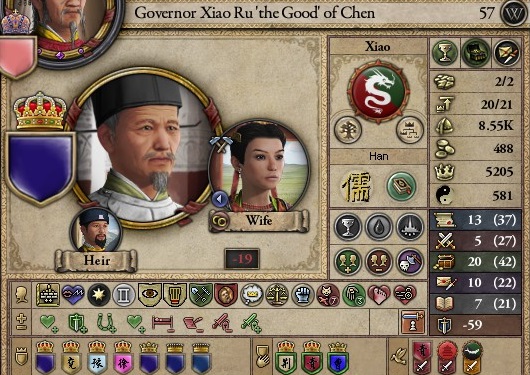
In the first week of July, the Yang court was finally betrayed by some of their followers, forcing the surrender of the province to Emperor Anwu. This campaign had taken around a year to finish, a complete and quick success for the new Liang Dynasty. The regents Gong Du and Gu were hanged for their opposition to the empire. As for the Lu Clan, they were all rounded up, transferred to Chang’an and put under strict house arrest, though on paper they remained as administrators and magistrates in the province. This included Lu Mao, who presented himself to Emperor Anwu still expecting to be made governor. At the same time, the barbarian revolt in Liang was being crushed by Yin Rong, ending bringing back peace through the whole realm. The Liang Dynasty now had an extensive access to the coast, which would prove an economic boon for the state. The Emperor could now return home victorious, a hero who had expanded his great dynasty. But his mind was already moving toward his next task, as in Chang’an stood the biggest threat to his authority yet.
His wife.
_______________________
PS: So thanks for everyone’s response to the last chapter! I was honestly not sure if anyone would still be hanging around to read it after a month of absence, so I’m happy that you liked it.
And also, this marks the end of Yang Province’s story. Independent Yang Province had an extremely interesting and troublesome story, but one that we were able to follow through all this AAR. In 196, Chen Wen finally broke free of Xu Province’s influence, only to die the following year. He left both Jing and Yang Province to Yang Weili, which led to what was probably one of the most damaging AAR we’ve seen. Yang Weili lost Yang Province in 201, leaving it to the old Lu Jun, who only had time to die and pass it to his son Lu Xun. Lu Xun had to rebuild a weakened state all while enduring two invasions from Hu Zan and barbarian raids. It’s honestly surprising that he managed to hold up to power. He even managed to expand into some southern barbarians and helped Xiao Ru in his war with Xu Province. But then Lu Xun died, leading to the messy regency of Lun Shi vs Lu Mao, the assassination of Lu Dun in 219 and finally the invasion of the province. After 24 years, with 19 under the Lu Clan, Yang Province is now back under someone else’s control. 







































